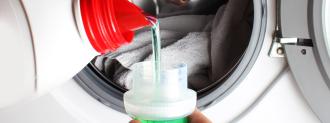Consumer goods company Unilever is now selling a laundry detergent that’s made using recycled carbon instead of traditional fossil fuels — making it the first cleaning product of its kind on the market.
The idea: Laundry detergents and other household cleaners contain substances called surfactants, which are traditionally derived from fossil fuels.
Getting rid of surfactants in the name of sustainability isn’t an option — they help the products foam up and clean — so Unilever instead decided to try making one from recycled carbon.
How it works: The process of making the recycled carbon laundry detergent starts with capturing carbon emissions from a steel mill in China.
Those emissions are then turned into ethanol, which is converted into ethylene oxide. That ethylene oxide can be used to create surfactants, which Unilever then incorporates into its new laundry detergent.
The cold water cycle: The recycled carbon laundry detergent is only available in China, and Unilever hasn’t said when it might offer it in other markets.
However, it has set a goal to remove fossil fuel-based chemicals from its cleaning products by 2030, so the next decade should see more products like this one hit store shelves worldwide.
“Advancements in technology like this mean we can now reinvent the chemistry of our products,” Peter ter Kulve, Unilever’s president of home care, said in a press release.
“Instead of valuable carbon being released directly into the atmosphere, we can capture it and recycle it in our products instead of using fossil fuels.”
We’d love to hear from you! If you have a comment about this article or if you have a tip for a future Freethink story, please email us at [email protected].






